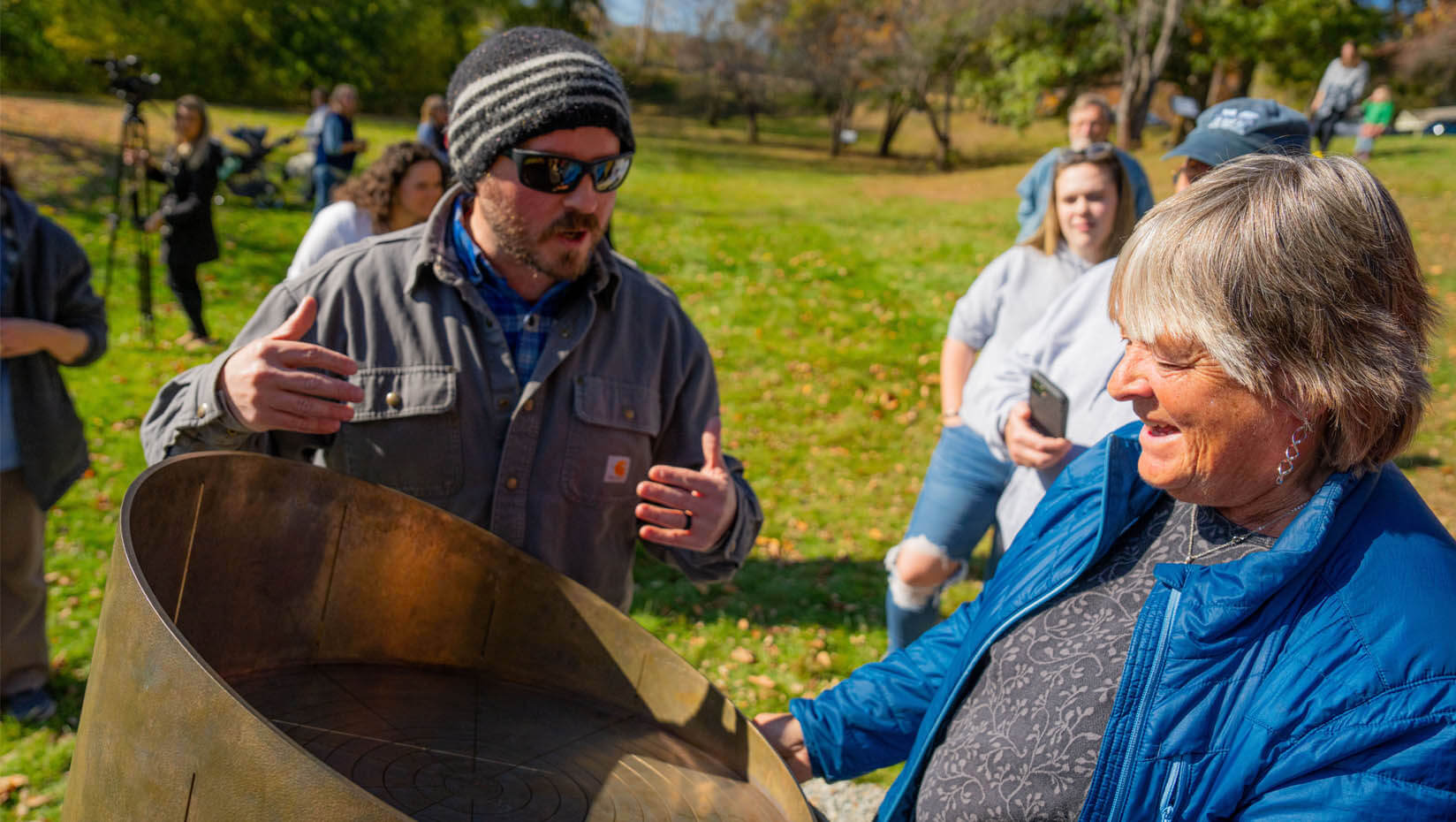
Maine has a new outdoor math learning lab with unveiling of interactive sculpture at Orono’s Webster Park
An interactive sculpture that harnesses the rays of the sun to help users explore multiplication and division was unveiled Friday in Orono’s Webster Park, the product of a unique partnership between the University of Maine and the Town of Orono.
Friday’s event marked the first public installation of the SunRule, which was invented by UMaine associate professor of mathematics education and instructional technology Justin Dimmel and associate professor of mathematics education Eric Pandiscio. The prototype sculpture was designed and built by UMaine associate professor of art Greg Ondo and sculpture studio technician Sam Hoey. Recent UMaine graduate Emma Reedman ’21 also was a member of the development team.
“Celebrating the installation of the first SunRule right here in Orono is only fitting,” says Dimmel. “Eric and I started this project in the first days of the pandemic, envisioning a handheld device made of cardboard that teachers could use outside. Through UMaine’s MIRTA accelerator program, our idea broadened, and we pivoted to develop an interactive sculpture that can be installed in parks, schools and museums. The functional, beautiful statue in Webster Park is a true testament to interdisciplinary collaboration and a teaching innovation that we’re so excited to share with Maine and the world.”
UMaine’s MIRTA accelerator is designed to advance research along the path to commercialization, turning lab innovations into real-world products and services with public benefit. Dimmel and Pandiscio participated in the program in 2021, and the opportunity to install the first sculpture in Orono developed through the SunRule team’s collaboration with the town’s director of community and economic development Mitch Stone, who served as an external adviser.
“Orono and UMaine work closely on a wide range of projects, but innovative and educational public art is certainly a first,” says Stone. “Locating the first SunRule in Webster Park means that students of all ages will have the opportunity to explore math outdoors and to help the SunRule team test their concept. We’re delighted that the university has donated this sculpture to the town.”
The SunRule presents multiplication and division in a new way and in a new environment, bringing learners outside and allowing them to visualize, using a scaling model, how these foundational mathematical concepts work. Sun shining through a series of slits in a ring that surrounds a circular bronze plate reflects onto a grid on the plate’s face. The angle of the plate can be adjusted by users, allowing them to manipulate the beam of light to multiply by different numbers.
“The SunRule helps users see multiplication as a continuous, stretching concept, providing a strong foundation for the ideas of ratio, scaling and slope that are critical to help students build necessary math skills as they progress through school grades,” says Pandiscio.
The SunRule is located in the west end of Webster Park, a short walk from the parking area. Designed to function best when the sun is high in the sky around midday, the SunRule is ready for use any time the sun is shining.
“Bringing UMaine research to life for the benefit of Maine people is a key goal of MIRTA,” says UMaine assistant vice president of innovation and economic development and MIRTA program director Renee Kelly. “Partnering with the Town of Orono to showcase the SunRule project in the heart of the university community is an ideal outcome that encourages public engagement and beautifully demonstrates the SunRule concept for prospective partners.”
Contact: Ashley Forbes, ashley.forbes@maine.edu
